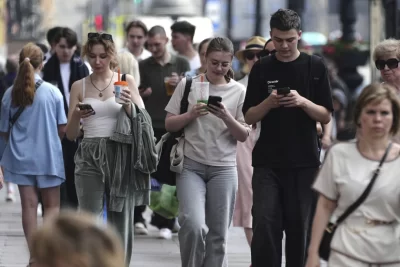
TALLINN, Estonia — A snappy tune by a blogger that mockingly laments his poor internet connection in the southern Russian city of Rostov-on-Don has gotten over a half-million views on Instagram in two weeks.
“How to say you’re from Rostov without saying a word? Show one bar of cellphone service,” Pavel Osipyan raps while walking around the city, smartphone in hand. “We have internet until 12 o’clock, and recently there’s been no connection at all. No need to be angry, just get used to it already.”
The complaints by Osipyan — unable to pay electronically for groceries, or having to use paper maps while driving — aren’t isolated to Rostov-on-Don, which borders Ukraine and, as home to Russia’s Southern Military District, is targeted frequently by drones.
In the last two months, cellphone internet shutdowns, which officials say are needed to foil Ukrainian drones, have hit dozens of Russian regions — from those near the fighting to parts of Siberia and even the Far East. Some Wi-Fi outages also have been reported.
Russians contacted by The Associated Press talked about card payments not going through, taxi and ride-sharing apps not working properly, ATMs that sometimes fail.
Experts point to the unprecedented nature of the measures and warn of far-reaching consequences in a country where the Kremlin already has significantly curtailed online freedom.
Such shutdowns in the name of security legitimize them to the public and open the door for authorities abusing the restrictions, said Anastasiya Zhyrmont, policy manager for Eastern Europe and Central Asia at the Access Now digital rights group.
A signal to regional authorities
Experts say the trend began in May, when Russia celebrated the 80th anniversary of the defeat of the Nazi Germany in World War II and foreign dignitaries flocked to Moscow for a big military parade.
The capital suffered severe disruptions of cellphone connectivity to the internet for days, and Kremlin spokesman Dmitry Peskov confirmed those were deliberate restrictions due to regular Ukrainian drone attacks. Asked how long they’d last, he replied, “This will be done as needed.”
Russia has restricted smartphone connectivity before, with isolated instances during protests, as well as in regions bordering Ukraine.
Shutdowns in the capital, however, sent a signal to authorities across the vast country that it’s a useful tool, said lawyer Sarkis Darbinyan, founder of Russian internet freedom group Roskomsvoboda.
Ukraine’s “Operation Spiderweb” in early June, in which drones launched from containers on trucks attacked airfields deep inside Russia, made officials all the more eager to take action, Darbinyan said.
“They got really scared that drones now may appear, like a jack-in-the-box, in any Russian regions,” he told AP.
By mid-July, deliberate shutdowns spread to most of the country, according to Na Svyazi — Russian for “staying connected” — an activist group tracking internet availability.
On Thursday, the group said 61 of Russia’s more than 80 regions suffered cellphone internet shutdowns. In 42 regions, there were reports of broadband network outages.
The Russian military reported downing 122 Ukrainian drones over a dozen regions overnight Wednesday to Thursday. It said 73 drones were shot down early Friday.
Some regional officials confirmed that cellphone internet was restricted for security reasons. Nizhny Novgorod Gov. Gleb Nikitin said this month the measure will stay in place in the region east of Moscow for “as long as the threat remains.”
Asked Thursday whether such mass shutdowns were justified, Peskov said “everything that has to do with ensuring the safety of citizens, everything is justified and everything is a priority.”
Unpredictable disruptions
Russians from affected regions say the outages can last for hours or days; patterns also are hard to discern, with service working in one part of a city but vanishing elsewhere.
In Voronezh, near Ukraine and frequently targeted by drones, one resident said she felt like she was in “a cave” in early July with no cellphone internet or Wi-Fi in her home. The woman, who spoke to AP on condition of anonymity because of security concerns, said she was only able to get online at work the next day.



